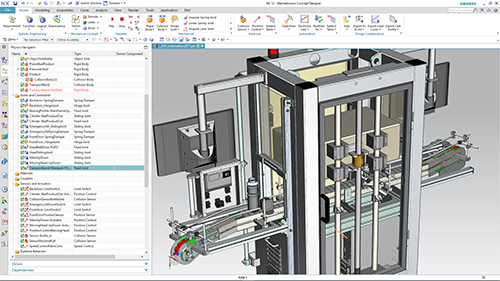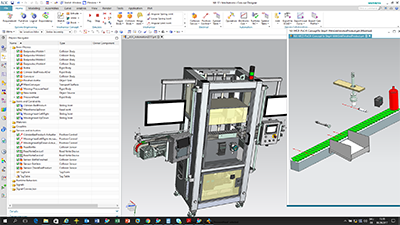- Allows machine builders to implement a modular design process resulting in increased design flexibility and data reusability.
- Machine evaluation done in a virtual environment using a digital twin results in reduced physical prototypes.
Siemens today announces a new solution for the industrial machinery industry, Advanced Machine Engineering. It addresses the challenges machinery manufacturers face today with ever-increasing product complexity along with the demand of rapid delivery times. The Advanced Machine Engineering solution provides a platform that connects mechanical, electrical and software engineering data and allows engineers to have access to a completely digital prototype, or a digital twin, that can be tested virtually throughout the development process. Establishing an engineering platform such as this can increase collaboration and reduce development time, delivery risk and costs, ultimately allowing for an increase in customer satisfaction at implementation and installation.
 “With this technology, customers are able to deliver their machines more quickly with higher-quality automated solutions,” said Thomas Strigl, business development leader, EDAG Production Solutions. “For example, their commissioning time on a real machine could be reduced up to one-third of the original time.
“With this technology, customers are able to deliver their machines more quickly with higher-quality automated solutions,” said Thomas Strigl, business development leader, EDAG Production Solutions. “For example, their commissioning time on a real machine could be reduced up to one-third of the original time.
”This solution employs a modularized product development strategy, which can establish common parts and processes among a family of products while defining functional modules that can be easily modified to meet a customer’s specific requirements and related changes. Employing advanced multi-disciplinary techniques can enable a move away from a serial development process to a more concurrent process, to effectively manage machine requirements to meet or exceed customer expectations. Siemens’ new Advanced Machine Engineering solution enables customers to concurrently develop products and manage the global supply chain in a way that can improve first-time quality at assembly. This approach can mean less development time, smaller component inventories and the ability to integrate a wider range of machine functions.
 The Advanced Machine Engineering solution leverages mechatronic design, which provides a common framework for mechanical, electrical and software disciplines to work in parallel. By establishing a common language between disciplines, or a digital thread, parallel collaboration from the earliest stages of product development is possible, which also allows for the re-use of existing designs. For example: mechanical designers can use concept models for detailed design; electrical designers can use model data to select the best sensors and actuators for each machine; and automation designers can apply cams and operational sequence data from the models to develop software. Leveraging this software can reduce the number of physical prototypes necessary during product development, thus reducing product development time and decreasing time to market.
The Advanced Machine Engineering solution leverages mechatronic design, which provides a common framework for mechanical, electrical and software disciplines to work in parallel. By establishing a common language between disciplines, or a digital thread, parallel collaboration from the earliest stages of product development is possible, which also allows for the re-use of existing designs. For example: mechanical designers can use concept models for detailed design; electrical designers can use model data to select the best sensors and actuators for each machine; and automation designers can apply cams and operational sequence data from the models to develop software. Leveraging this software can reduce the number of physical prototypes necessary during product development, thus reducing product development time and decreasing time to market.
Reducing physical prototypes, and the costs associated with them, is further enhanced through the use of complete digital twins of machines that can now be built to design, test and commission new products. Taking advantage of Siemens’ end-to-end solutions for the digital enterprise enables design concepts to be built quickly with the capability to simulate the effect of variables such as gravity, friction and the performance of electrical systems, fluids and pneumatics. Utilizing these digital twins for virtual commissioning creates an efficient product development cycle that allows testing before the product is even built. Identifying issues earlier in the development cycle can prevent expensive delays at implementation or later in the process.
“Siemens’ new Advanced Machine Engineering industry solution can effectively manage complex processes and control costs, all while speeding up time to market and customers’ time to value,” said Rahul Garg, senior global director, Industrial Machinery and Heavy Equipment, Siemens PLM Software. “By leveraging our software tools, companies can optimize iterative system designs, and capture and re-use institutional knowledge and best practices, to create an innovative, modular approach to machine design and deliver the most advanced machines on the market today.”
For more information about our solutions for the industrial machinery and heavy equipment industry, visit https://www.plm.automation.siemens.com/global/en/industries/industrial-machinery-heavy-equipment/index.html.
Siemens PLM Software, a business unit of the Siemens Digital Factory Division, is a leading global provider of software solutions to drive the digital transformation of industry, creating new opportunities for manufacturers to realize innovation. With headquarters in Plano, Texas, and over 140,000 customers worldwide, Siemens PLM Software works with companies of all sizes to transform the way ideas come to life, the way products are realized, and the way products and assets in operation are used and understood. For more information on Siemens PLM Software products and services, visit www.siemens.com/plm.






